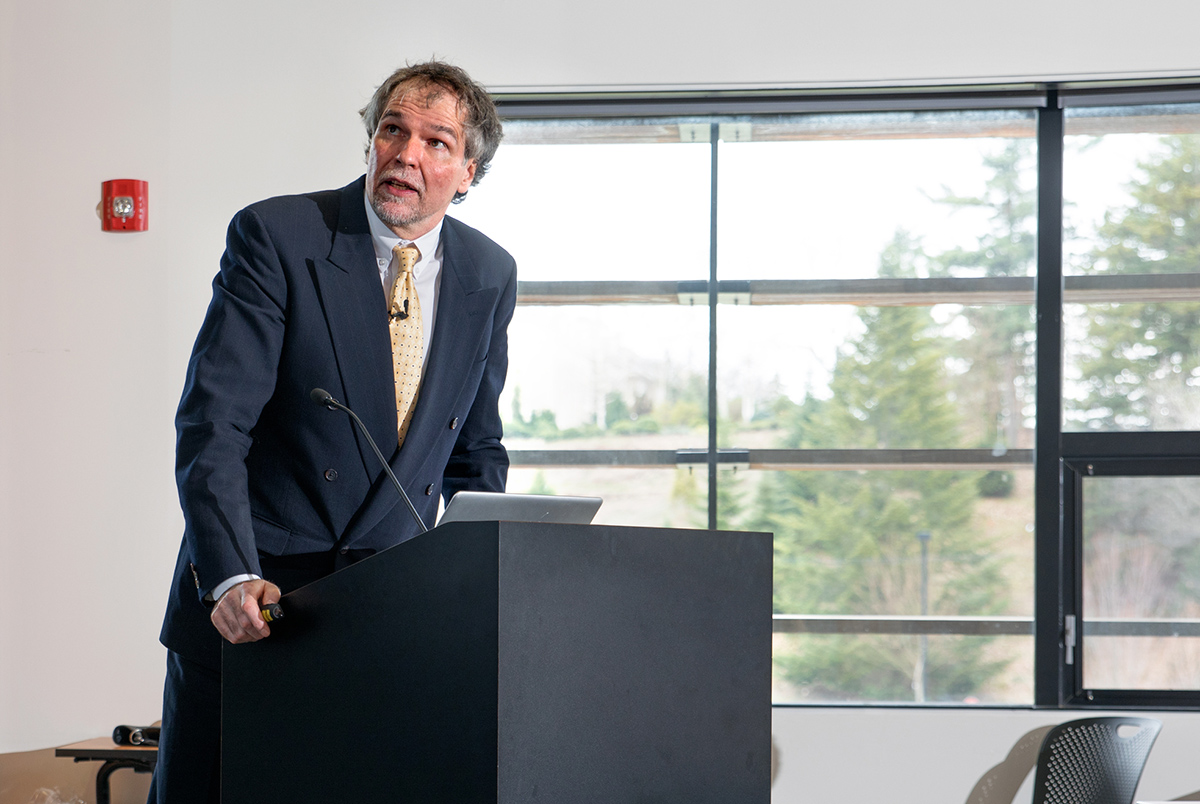Doris lecturer discusses recipe for moral improvement
By Stephen D'Angelo

On April 12, what would have been professor emeritus of human development John L. Doris’ 94th birthday, his son, John M. Doris, delivered the 10th annual John L. Doris Memorial Lecture hosted by the College of Human Ecology’s Bronfenbrenner Center for Translational Research.
Taking its cue from John L. Doris’ work in human development, the Doris Lecture series showcases speakers who study and promote the well-being of children, youth and families.
John M. Doris, professor in the Philosophy–Neuroscience–Psychology Program and Philosophy Department at Washington University in St. Louis, presented “Marking Good: Can We Realize our Moral Aspirations?,” a talk that incorporated the fields of human development and moral philosophy, to a full room at the Cornell Botanic Gardens Nevin Welcome Center.
“The task of making children’s lives better is making them better people, and that’s what I’m going to wonder about with you today,” he said. “Today, I’d like to take some hesitant steps towards articulating a ‘recipe’ for moral improvement.”
Doris set the tone of the lecture with what he described as an obvious fact – some people are better than others. According to Doris, there are individual differences in moral functioning and, therefore, for example, civil rights pioneer Rosa Parks would be considered “better” than Pol Pot, the genocidal Cambodian tyrant.
“What accounts for individual differences in moral functioning? Often we think about the question: Is it grace or grit? Are moral differences just a matter of genetic endowment or is it something we can sort of work for and earn?” Doris asked. “If our aspirations are to make ourselves, our youth and each other morally better, then the question is 'how?' Is there some kind of recipe for moral goodness?”
According to Doris, since the time of the Greeks, philosophers have proposed that moral functioning be understood as a skill, like making music or playing chess. But after 2,500 years, the evidence is far from clear on what the acquisition and development of moral skill requires.
Doris pointed out that simple theories are bad theories; there are just too many factors to be considered.
Does intelligence improve morality? Not really. Does reading literature help? No sufficient evidence. Are parents influential on a growing child’s morality, in normal circumstances? Basic parenting differences don’t matter that much. How much does early education and early socialization play in moral development? Modest at best. Does socialization impact morality from a young age? Mixed results.
According to Doris, there is no magic bullet and prerequisites for obtaining moral skills are unclear. There is not going to be one exercise to do to make our children, ourselves and the world better, he said.
“The best we can say, I think, is that many simply small influences make combined influence levels of moral skill,” Doris said. “There may be many not-so-magic bullets, and we want to know what those bullets are and how best we can deploy them. After all, piecemeal solutions are by definition solutions, and probably the best we can do is find little ways to improve moral skill and leverage them as much as we can.”
The lecture’s namesake, John L. Doris, was professor emeritus of human development and founding director of the Family Life Development Center, one of the precursor centers to the Bronfenbrenner Center for Translational Research, and served as a resource for extension work, research and teaching on issues of family stress and child maltreatment. Doris joined the Cornell faculty in 1963 and served as director of the center from its establishment in 1974 until his retirement in 1993, though he continued to work on center programs until his death in 2008.
Stephen D’Angelo is assistant director of communications for the College of Human Ecology.
Media Contact
Get Cornell news delivered right to your inbox.
Subscribe